Percussion caps are a crucial component of black powder firearms, providing the reliable ignition needed for a safe and successful shot. Understanding their function, types, and proper handling is essential for any black powder enthusiast. This comprehensive guide delves into the world of percussion caps, offering insights for both beginners and experienced shooters.
Understanding Percussion Caps
Percussion caps are small, metal containers filled with a highly sensitive primary explosive, typically a mixture of mercury fulminate and other compounds. These caps are designed to ignite when struck by the hammer of a firearm, creating a spark that detonates the black powder charge in the firearm's barrel. Their reliability is paramount, as a misfire can lead to dangerous situations. The consistent performance of percussion caps is directly tied to their quality and proper storage.
Types of Percussion Caps
While the core function remains the same, several variations exist in percussion cap design, impacting their fit and compatibility with different firearms:
-
Size and Caliber: Percussion caps are manufactured in various sizes, designated by numbers or letters, reflecting their diameter and overall dimensions. It's crucial to use the correct size cap for your specific firearm to ensure a proper fit and reliable ignition. Using the wrong size can lead to misfires or damage to the firearm.
-
Material: Most commonly, percussion caps are made from copper or brass. The material choice impacts durability and corrosion resistance. Copper caps are generally preferred for their relatively low cost and good performance.
-
Primer Composition: While mercury fulminate is common, the exact composition of the primer mixture may vary slightly between manufacturers. This can subtly affect the sensitivity and reliability of the cap.
Selecting and Storing Percussion Caps
Selecting the right percussion caps is vital. Always choose caps from reputable manufacturers known for consistent quality and reliable performance. Never use damaged or deteriorated caps, as they may fail to ignite reliably or pose a safety risk.
Proper storage is crucial for maintaining the effectiveness of percussion caps:
-
Dry Environment: Moisture is the enemy of percussion caps. Store them in a cool, dry, and airtight container away from direct sunlight and extreme temperatures. A desiccant pack can help maintain optimal dryness.
-
Away from Flammables: Keep percussion caps far away from any flammable materials and away from open flames.
-
Separate Storage: Store percussion caps separately from black powder and other ammunition.
Handling Percussion Caps Safely
Safe handling of percussion caps is non-negotiable:
-
Avoid Static Electricity: Static discharge can potentially detonate a percussion cap. Handle them carefully, avoiding rubbing against synthetic materials or other surfaces that can build up static.
-
Gentle Handling: Avoid dropping or jarring percussion caps.
-
Proper Insertion: Carefully insert the cap onto the nipple of your firearm, ensuring a secure fit.
Troubleshooting Percussion Cap Issues
Occasionally, you might encounter issues with percussion caps. Here are some common problems and potential solutions:
-
Misfires: This could be due to a faulty cap, a problem with the firearm's mechanism, or improper handling. Check the cap, the firearm's condition, and your technique.
-
Weak Ignition: This might indicate a weak or damp cap, or insufficient powder in the firearm. Always use fresh caps and ensure correct powder charges.
Conclusion
Percussion caps are integral to the safe and reliable operation of black powder firearms. Choosing the correct type, storing them properly, and handling them carefully are crucial for a successful and safe shooting experience. By following these guidelines, black powder enthusiasts can enjoy the tradition and accuracy of percussion firearms.

